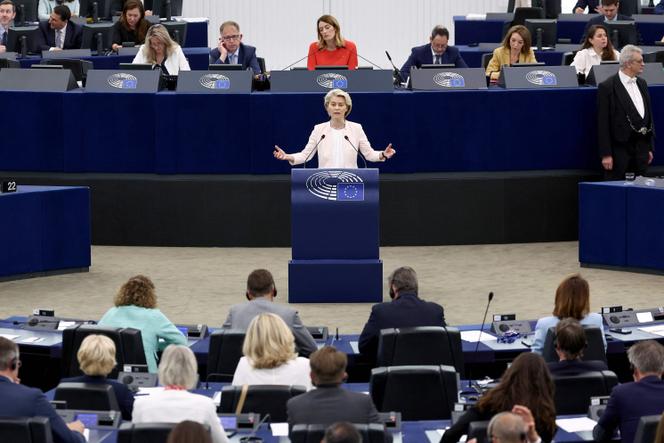


The future of the European Green Pact will be written in the coming months. At this stage, there is no guarantee that it will enable Europeans to achieve carbon neutrality by 2050 as they committed to in the Paris Agreement. In her speech to the European Parliament on Thursday, July 18, Ursula von der Leyen pledged to implement and pursue the plan but remained vague about the reality of her ambition.
Angela Merkel's former defense minister, who had put the fight against global warming at the heart of her program in 2019, when she first stood before MEPs, is now defending a European Union (EU) "that sticks to the objectives of the green pact in a pragmatic way."
Ursula von der Leyen did the bare minimum to avoid alienating the Greens, Social Democrats and Liberals of Renew Europe. She mentioned a few new features – plans for climate adaptation and a "pact for the ocean," without going into further detail. She reaffirmed her determination to enshrine in law the goal of a 90% reduction in CO2 emissions by 2040, without dwelling on the means to achieve it.
The President of the Commission focused on defending the industrial aspect of the Green Pact on which there was broad consensus in the House, announcing "a new pact for clean industry" to speed up the decarbonization of industry and energy. Much to Berlin's satisfaction, she also intends to authorize carmakers to explore other avenues besides the electric car, notably the use of synthetic fuels, in preparation for 2035, when only zero-emission vehicles will be allowed on the market. "Some may say that [the EU] is not sounding the bell for the end of the internal combustion engine," said Macronist MEP Pascal Canfin, while the European ambition is maintained.
Ursula von der Leyen has remained minimalist on the subject of agriculture which has so far contributed very little to the Union's environmental transition. The efforts of livestock farmers and cereal growers to preserve biodiversity should be "rewarded," she declared, ruling out the idea of making Common Agricultural Policy subsidies conditional on environmental protection. She said nothing on the use of pesticides.
"Is this a green program? I can tell you that the answer is no," reacted Terry Reintke, co-chairwoman of the European Parliament's Green group, who nevertheless called on her troops to support von der Leyen to keep the far right at bay.
Act I of the Green Pact – some 60 legislative texts designed to enable the EU to reduce its CO2 emissions by 55% by 2030 – was played out between 2019 and 2024, even if there were a few hiccups, notably on projects concerning the rural sector, which farmers' protests in early 2024 got the better of. Act II now seems more uncertain as resistance to the green pact has grown across the Old Continent over the past year.
You have 43.05% of this article left to read. The rest is for subscribers only.
